Dementia care at home
Outstanding dementia care in the comfort of your own home
- Live-in care is an alternative to residential care homes that allows people living with dementia to receive personalised, one-to-one support without leaving their homes.
- As one of the UK’s leading dementia care providers, we offer unrivalled, specialist expertise in dementia care, led and supported by our own consultant admiral nurse.
- We can provide a free, no-obligation assessment to help you decide if at home dementia care is right for you.
We know how worrying and stressful it can be when faced with the reality that a loved one living with dementia or increasing memory loss is struggling to cope alone. Many families believe moving their loved one into a care home is their only choice.
Moving at any stage in life can be disruptive and stressful. When an individual is living with dementia the process of moving to a care home, away from their much-loved home and its treasured memories and possessions, can be heart-wrenching and affect their ability to live well with dementia.
At The Good Care Group, we know receiving care in the comfort, safety and familiarity of your own home has far reaching benefits in improving health and wellbeing for a person living with dementia. For over 10 years, we’ve helped countless families just like yours receive the dedicated dementia care they need in the place they love most – their own home.
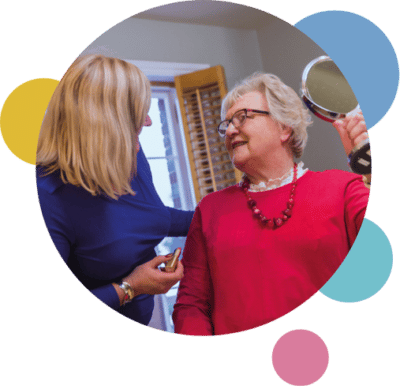
We know how worrying and stressful it can be when faced with the reality that a loved one living with dementia or increasing memory loss is struggling to cope alone. Many families believe moving their loved one into a care home is their only choice.
Moving at any stage in life can be disruptive and stressful. When an individual is living with dementia the process of moving to a care home, away from their much-loved home and its treasured memories and possessions, can be heart-wrenching and affect their ability to live well with dementia.
At The Good Care Group, we know receiving care in the comfort, safety and familiarity of your own home has far reaching benefits in improving health and wellbeing for a person living with dementia. For over 10 years, we’ve helped countless families just like yours receive the dedicated dementia care they need in the place they love most – their own home.
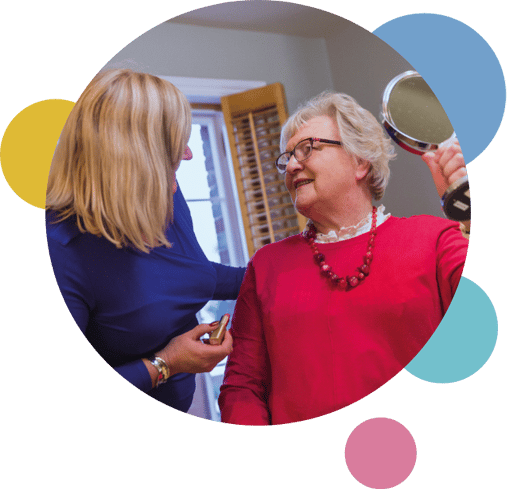
What is dementia?
Dementia describes different brain disorders that trigger a loss of brain function. These conditions are all usually progressive and worsen over time.
Alzheimer’s disease is the most common type of dementia, affecting between 50 and 75 per cent of those diagnosed.
Other types of dementia include vascular dementia affecting up to 20 per cent of those diagnosed, frontotemporal dementia affecting 2 per cent and dementia with Lewy bodies between 10 and 15 per cent.
Symptoms of dementia include memory loss, confusion and problems with speech and understanding and sadly it is a terminal condition.
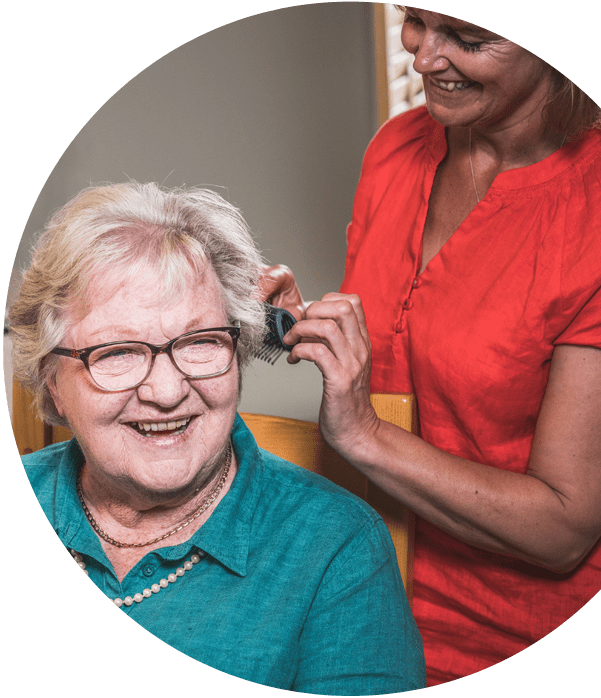
Who is
affected?
- There are currently around 850,000 people with dementia in the UK. This is projected to rise to 1.6 million by 2040.
- 209,600 will develop dementia this year, that’s one every three minutes.
- 1 in 6 people over the age of 80 have dementia.
- 70 per cent of people in care homes have dementia or severe memory problems.
- There are over 42,000 people under 65 living with dementia in the UK.
- More than 25,000 people from black, Asian and minority ethnic groups in the UK are affected.
Our specialist dementia care provided by experts
Our expert caregivers are dedicated to keeping your loved one safe and happy at home. All our carers are expertly trained in how to care for someone living with dementia and use a range of best practice techniques proven to provide reassurance, reduce anxiety and calm behaviours. This compassionate approach reduces the need for the anti-psychotic drugs used widely in many care home settings,
We adopt a blended approach to delivery of dementia care, led and supported by our own Consultant Admiral Nurse. This support from an Admiral Nurse, working with leading dementia charity Dementia UK, means we can offer unrivalled levels of emotional and practical support to those living with dementia and their families.
- Full assessment before care starts
- Bespoke and flexible care plan developed with input from the family and other healthcare professionals
- Social activities and lifestyle enhancement
- Specialist support and expertise – 24 hours a day, 7 days a week
- Matching of the most suitable care team to meet the
holistic needs of our clients - Dedicated care team led by an expert regional care
manager - Meal planning and household tasks
- Access to clinical expertise and medical support
Meet our dementia expert
Our approach to live-in care with dementia is developed and led by our in-house team of clinical experts. Working closely with leading dementia charity Dementia UK, uniquely we have our very own full-time consultant admiral Nurse, Dr Jane Pritchard. With our in-house Occupational Therapist, Katrina Burns they both offer practical and emotional support to our clients and their families at what can be a very difficult time. We adopt a multidisciplinary approach to our dementia care service working alongside healthcare professionals to ensure positive outcomes for all our clients. This means they can stay safely and happily at home with the right support and equipment to get the most out of their life.

Please watch our short video, which explains how we care for people with dementia, then call one of our trained advisors on 0203 728 7577 to learn if live-in care may be right for you.
What does our
dementia care
include?
Dignity and respect are at the forefront of everything we do. Our highly trained carers work closely with those living with dementia to learn about their past, personality and preferences. Whether it is helping with social activities or simply listening, they take the time to understand the person being cared for and look for ways to enhance their quality of life in a way that respects their choices and preferences.
Specialist nurse-led care
Importantly for those living with dementia, we are able to provide nurse-led care if and when it is needed. Our professional carers are trained to monitor and identify any changes in your health, responding appropriately and avoiding any unnecessary hospital admissions. As part of our commitment to delivering a high-quality home care service, we monitor and measure health outcomes to ensure we continually improve the care we provide.
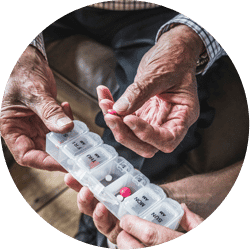
Managing and administering medications
Our professional carers are trained in medications management and use an electronic medications system to ensure all medications are managed proactively and effectively. They will also collect prescriptions from the pharmacy.

Ensuring safe mobility in and around the home
Our in-house Occupational Therapist, Katrina Burns will make a review of a person’s overall ‘function’ to address how they can safely navigate around their home. She will then provide expert guidance and advice as to what equipment can improve safe movement and mobility around the home, whilst minimising falls. Katrina is well placed to provide advice and recommendations as to any home adaptations that may make life easier. She will continue to review a person’s on-going function to keep them well and safe at home as their cognitive function deteriorates as the condition progresses.


Companionship as and when you need it
Our carers will provide companionship whilst ensuring your privacy is respected. We ensure that a perfectly matched carer shares similar values and interests as you to make life interesting, stimulating and enjoyable, whilst being there for you to support your emotional and psychological needs.
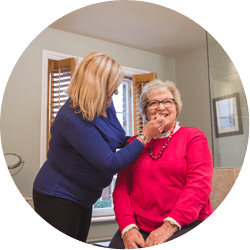
Providing discreet and sensitive personal care
This can include the task-orientated aspects of caring for someone, like bathing and getting dressed, but also those that promote self-esteem, like having your nails maintained, or your hair styled.


Planning and cooking meals
Meals will be planned and cooked according to your choice, preferences and nutritional needs, all served at a time that suits you.

Facilitating social arrangements in the home
Your carer will ensure you can invite friends over for socialisation and celebrations, providing the support you need to enjoy yourself and not worry about organising anything.


Trips and visits out of the home in your local community
Our carers know how important it is to ensure you can continue to do as much you wish and that you remain connected to your local community – whether that is a stroll round the local park or attending clubs or groups in the local area or visiting friends, or those shops you always have.
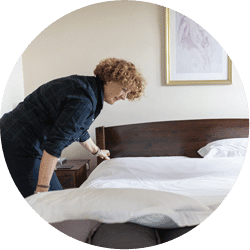
Domestic tasks
This includes cleaning of all rooms and vacuuming throughout to keep your house to the standards of cleanliness and tidiness you always have.


Caring for your
much-loved pet
Carers will happily support looking after your pet, including taking dogs for regular walks.
How can dementia
care be provided?
Our specialist home care can be provided in the following ways for someone living with dementia:

24-hour live-in care
24-hour Live-In Care for when round the clock care is needed to ensure a person can continue to live well in their own home. Familiar surroundings and routines are paramount in helping those living with specialist conditions like dementia.

Short term care
Short term care, intermediate care or convalescent care following discharge from hospital or for those needing post-operative rehabilitation or recovery from illness.

Respite care
Respite Care can provide a family carer with a much-needed break from caring for a loved one, or can be used as an opportunity to see how live-in care works and whether it is right for you and your family.

Emergency care
Emergency care at home for those who need an urgent live-in care arrangement put in place following unexpected surgery an accident or sudden illness.
Support for every stage of dementia
‘EVER’ our
dementia care model
Our dementia model has been developed by our in-house specialists, Dr Jane Pritchard and Jackie Cooper. It articulates how we achieve the best care for people living with dementia and their families.
‘EVER’ is an acronym of the following:
- Engagement
- Validation
- Enrichments
- Relationships
Our dementia care models page, provides everything you need to know about this model.
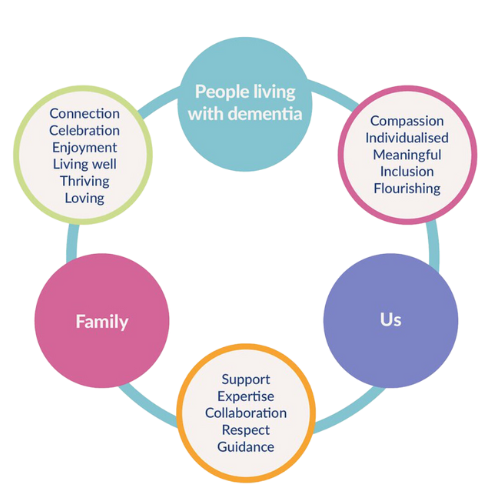
Early stage
dementia
At this stage our carers will focus on ensuring you are able to live as independently as possible while still receiving the care you need, in a way that enhances your wellbeing.
Social strategies
Lifestyle choices will be encouraged and actively promoted by our carer. Eating well and exercising regularly, as well as keeping the brain active through puzzles, reading and socialising, are all proven to have a positive impact on wellbeing.
Practical strategies
Strategies can be put in place to support memory loss – for example, writing to do lists, settling on one place to keep important items and having a pad close by to take notes. Our goal at this stage is to provide the assistance the person needs while still encouraging as much independence as possible.
Communication strategies
A person in the early stages of dementia is likely to experience changes in their mood and may become agitated, anxious or depressed. Some may start to lose interest in things they previously enjoyed. Our carers are trained to work with such situations and encourage and stimulate a positive attitude and thinking to lift spirits and enhance wellbeing.
Mid stage
dementia
While everyone’s journey with dementia is different, the signs of the middle stage of dementia often mark the moment when changes to a person’s care arrangements are necessary. The middle stage can be the longest and sometimes the most challenging for the person with the condition and those that care for them.
Social strategies
At this stage many people living with dementia experience feelings of depression, anxiety, anger or repetitive behaviours. Our carers understand what behaviours are common during this stage and know how to provide compassionate assistance to the person with dementia in a positive and reassuring way.
Practical strategies
Our professional carers are trained to identify changing care needs and move at the client’s pace, adapting their approach as needs increase. They can offer physical support, should it be needed, including bathing, dress and eating, as well as encouraging gentle exercise that maintains strength and mobility.
Communication strategies
During the mid stage of dementia, it is common for people living with dementia to gradually lose their ability to find words, express thoughts and follow conversations. Our carers are sensitive to emotions and respond positively to any signs of distress, finding shared, simplified language that enables the person living with dementia to communicate and express feelings.
Late stage
dementia
Dementia in all forms is a progressive condition and by the time it reaches later stages it is very likely that the person with dementia will need round-the-clock support. During this stage the person living with dementia is likely to have become extremely frail have severe memory loss. They may have trouble with communicating, eating and even swallowing. They may also spend long periods of time inactive and become prone to infections.
Social strategies
At this stage the world is primarily experienced through the senses. Our carers help the person with dementia to experience the world through touch, taste, smell and sound. For example, listening to a piece of music together can help someone feel safe, connected and loved while looking through old family photos together can spark happy memories.
Practical strategies
During late stage dementia more specialist medical care may be needed. Our care teams are supported by leading clinical experts in the field of dementia care who guide our approach. Carers can draw on the expertise of our in-house consultant admiral nurse and Occupational Therapist. Carers proactively use techniques required for safe moving, pre-empting medical issues, identifying infections that reduce medical admission. For many our care is life changing with fewer falls, less infections and reliance on antipsychotic drugs.
Communication strategies
The role of our carers at this stage is to preserve dignity and quality of life. Communication is key at this stage. All our carers are trained to have meaningful interactions with those they are caring for when speech is limited – eye contact, gestures or shared experiences all provide ways to make a connection.
Cost of dementia care
The cost of live-in care for dementia patients is typically in line with – and sometimes less than – what you would pay for residential care, with the added benefit of receiving one-to-one tailored care which is difficult to achieve in a care home.
It is also worth considering that live-in care is often cheaper than the total cost of domiciliary care for people living with dementia. When a person is receiving hourly domiciliary care, they are often charged for additional services to support the person’s dementia needs on top of the cost of the carer visiting. These extras can add up over time. This means providing hourly care to someone living with high or complex needs is often more expensive than the price of an inclusive live-in care service.
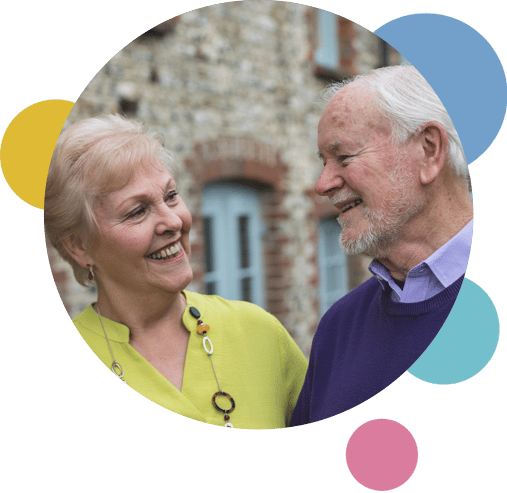
Dementia care
for couples
Live-in care is a cost-effective option if you are a couple and one or both of you are living with dementia. A care home would charge double for two packages of care, whereas there is only a nominal extra cost if you both receive care at home at the same address.
Devastatingly for couples, most care homes would have to separate you and your partner to give you the care you need. With the care and support of a live-in-carer, you can both continue to live life your way with the reassurance that you are getting the very best one-to-one care that meets both your needs.
Why choose The Good Care Group?
We have been providing high quality, live-in care to families in England and Scotland for over 10 years. At the heart of our award-winning service is enabling people to live independently in their own home with an improved quality of life. Our approach to care at home means our clients can achieve improved health and well-being. For families they benefit from peace of mind and reassurance that their loved on is receiving the very best care and support.

A perfectly matched care team
We know how important choosing just the right carer is for you and your family. We will work with you to carefully choose a carer that can meet all your care and support needs, while sharing common interests and backgrounds. Your care team really get to know you and your unique needs, which means you get consistency of care. We know this means life is enjoyable for everyone.

Expertly trained carers
All our professional carers complete our leading training programme before they care for our clients. Our programme has been created with leading charities and clinical experts. It goes beyond mandatory requirements in the care sector. Our carers never stop learning new skills to further enhance the care they provide.


Continuity of care
Unlike an agency we employ our carers. This means, they are committed to us, as we are to them. Carers enjoy the security of being employed, which means they stay with us longer. Those who work for agencies move around more. For families this means that you get continuity and consistency of the same care team caring for your loved one with no disruption to your loved one’s life.

In-house clinical expert
We have a dedicated team of in-house clinical experts. This includes a specialist consultant nurse, who also provides Admiral Nurse services to those living with dementia and our own in-house Occupational Therapist (OT) who works closely with healthcare professionals and our care teams. These expert leads, monitor and support our care teams to delivery best practice nurse-led care at home.


Innovative care technology
Unlike any other live-in care provider, we have our own online care community. Families, health-care professionals and carers can access up to date information about the care being provided. For our families, it provides a reassuring window into the care their loved one is receiving. For our clients, it means enjoying time online such as video calls with family or shopping online.

Improving health outcomes
Every decision we make is driven by delivering improved health outcomes for our clients. Our digital technology allows us to predict risk and shape the care we provide. We measure health outcomes and use this information to improve the quality of our client’s lives. Our health and well-being focused care reduces risk of infection, falls in the home and hospital admissions, while improving independence and quality of life.


Highest service rating from care regulators in England and Scotland
Unlike introduction agencies we are fully regulated in England and Scotland. This means the care and support we provide is regularly inspected. We are the only dedicated live-in care provider in England to achieve an ‘Outstanding’ rating by the Care Quality Commission (CQC) in all five measures – safe, effective, caring, responsive, and well-led. We know this provides families with peace of mind that their loved one is receiving the best possible care.
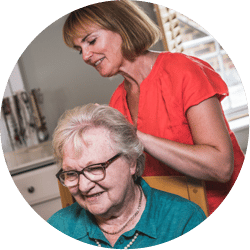
A fully managed service
Families benefit from our fully managed service delivered by care experts. This means you do not need to worry about employing, supervising, or managing the carer looking after your loved one. Our professional carers are supervised by an experienced care manager and supported by clinical experts that are on hand 24 hours a day, 7 days a week to support you, your loved one and our carer teams.


Local teams with national coverage
We operate throughout England and Scotland with a local approach to management of our teams near you. Each dedicated care manager local to you has only a small number of clients to support. This means they can provide higher levels of monitoring and support than other home care providers. It also means a highly personalised approach to care can be delivered.
Useful resources
To support you and your family we have created a useful dementia care guide which provides you with information and advice on how to provide person-centred dementia care following a diagnosis of dementia. There are also a number of dementia charities across the UK who provide families with help, advice and support when they need it most, including Dementia UK and the Alzheimer’s society.
FAQs
Dementia care is a type of specialist care provided to people living with dementia that can no longer live safely and independently at home. This type of care is provided directly in the clients’ home by experienced carers trained in how to best care for someone living with dementia.
It can be difficult to know when your loved one is in need of dementia care. While everyone’s journey with dementia is different, here are some signs that your loved one could benefit from dementia care at home:
- Frequent memory loss
- A decline in physical health
- An increased number of falls
- Weight loss or difficulty with dining
- Forgetting to take medications
- Becoming withdrawn or a lack of socialisation
- Caregiver burnout
Dementia care at home offers many benefits over moving into a care home, including:
- One-to-one care and support around the clock – similar support simply cannot be achieved in any care home.
- A uniquely developed, highly personalised plan of care designed to meet your care needs with none of the rigid timetables or set routines experienced in a care home.
- Specialist and complex care provided by highly trained carers delivered in the comfort of your own home. Familiar surroundings and routines are paramount in helping those living with specialist conditions, like dementia.
- No need to move out of your much-loved home, with all the upset and disruption that brings.
- Continue to live with your beloved pet and the carer will support looking after it.
- Considerable and proven benefits to overall health and wellbeing, with much needed peace of mind and reassurance for family members.
- Elderly couples who require care can stay together as a loving couple, as opposed to being split up to be cared for in different areas of a care home.
- Continuing to be part of the local community you have loved, for what might have been many years.
There may be care funding available to you to receive a live in care service depending on your financial circumstances and your care needs. The Local Authority will only fund care at home (referred to as social funding) if your assets are worth less than £23,500, which we know that sadly for many families their financial situation exceeds.
If you are assessed and have an identified healthcare need you may be eligible for NHS Continuing Healthcare funding organised by your local Clinical Commissioning Group (CCG) to support you to receive care in your own home.
Many families are faced with having to fund the care they receive themselves (referred to as self-funding care). For these families there are options to help finance care at home, including a Care Fees Annuity, which is an insurance policy you purchase to cover the cost of your care, or by realising capital in your assets through an Equity Release scheme. Read more about care funding here.
If you get in touch with us, you can speak to a dedicated care advisor who will answer any questions you may have and provide any information you need to make the right decision.
We will then arrange a no-obligation home meeting with you and your loved one, either at your home or in hospital if you are awaiting discharge following treatment. We can all discuss their needs and how we will match the perfect professional carer for you so we can get the right team and right care package in place at the right time.
View more about our dementia care services
Other conditions we care for
Talk to us about your dementia care needs
Our friendly and experienced team is here to help you and your family make sense of the options available to you. Call us today – we will help you every step of the way.